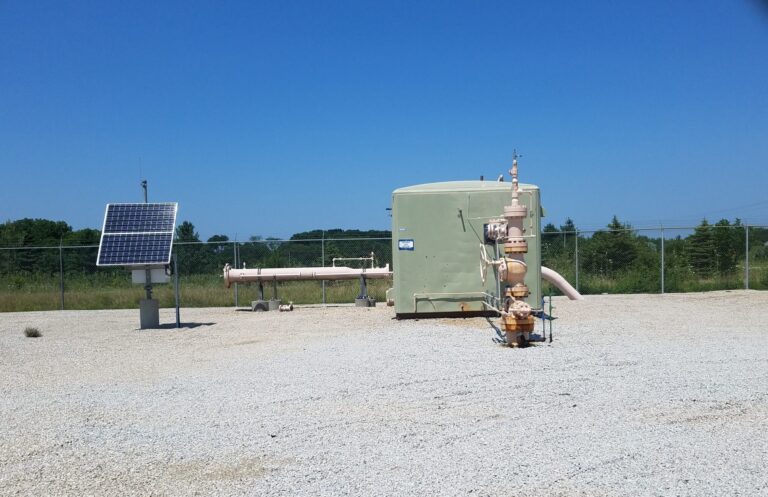MAHOMET – Relief is in sight for some rural residents of Champaign County, whose well water was contaminated by a natural gas leak. They could eventually be hooked up to a nearby public water system.
Jodi Eisenman is one of these residents. Jodi, her husband Derric and their children live on a farm located between Mahomet and Fisher in northwest Champaign County. Jodi has lived in the country all her life, and until the gas leak, she depended on water from her own well instead of what she calls “city water.”
“It just looks like Sprite,” said Eisenman of the water contaminated by natural gas. “You can see the bubbles, the gas just bubbling off of it.”
The leak into the Eisenman family’s water well came from one of the gas wells at the Manlove Field natural gas storage facility. Chicago area utility Peoples Gas uses the site to store piped-in natural gas in porous sedimentary rock thousands of feet below the Mahomet Aquifer, which supplies water to the Eisenman’s well. Peoples Gas discovered and stopped the gas leak in late 2016. But Jodi Eisenman says the gas that did leak out is still in wells at her property and those of her neighbors.
“It stains our showers it stains our toilet, it’s a different color,” said Eisenman. “So yeah, that’s our daily everyday, this methane gas in your water. It’s just constantly something you’re dealing with.”
The Eisenmans have been using bottled water and a gas/water separator for practically all of their water needs ever since the gas leak was detected more than four years ago. Jodi Eisenman says that’s because the leaked gas is still in the aquifer, and permanently removing it is a slow process at best.
The Eisenmans use the bottled water for drinking and cooking. Jodi says water filtered by the separator is still not completely pure, but is usable for other needs, including laundry (with a strong detergent to avoid discoloration) and to water a steer kept by one of her children for a 4-H show project. She says the animal refuses to drink the untreated water.
Meanwhile, Eisenman and other affected residents have been looking at another option: hooking up to “city water,” in this case the Sangamon Valley Public Water District, located a few miles to the south.
Kerry Gifford is the general manager for the Mahomet-based water district. He says since the district doesn’t impose a property tax in the district, residents would only pay for Sangamon Valley water if they use it.
“No, we’re not going to force anyone to hook up — I mean, we will run legally to where we can with a service line,” said Gifford. “I think we’re going to be pretty popular with wanting to go up there because some of those people, I don’t know, if they have any home value left, that’s what’s happened.”
Gifford says it could cost up to $10 million for the Sangamon Valley Public Water District to extend a new water line up Illinois Route 47 to reach the 100 or so residents who were, or may be, affected by the gas leak.
The leaked gas is capable of migrating to different spots in the Mahomet Aquifer, said attorney Matt Duco with the law firm Spiros Law, which is representing the Eisenmans and thirteen other households in a civil lawsuit against Peoples Gas over the leak.
“And we have seen it move,” said Duco of the leaked gas in the aquifer. “And some people who thought they were lucky and didn’t have water on their property contaminated learned several years later that it is.”
Gov. J.B. Pritzker signed legislation in June that places the Eisenmans and other residents affected by the gas leak within the Sangamon Valley Public Water District. Last year’s capital appropriations bill authorized more than $ 3 million for the water district to use on the first phase of their water line extension.
State Sen. Chapin Rose (R-Mahomet), who sponsored the water district bill and worked for the funding for the new water hookup, said his district could have used that money on other things.
“Except it had to go get spent on this one,” said Rose, “because it’s important, but it’s this one that should be paid for by Peoples Gas. I mean, it’s just ridiculous. This is not the taxpayers’ [problem] to clean up.”
Jodi Eisenman agrees.
“The taxpayers of Illinois [didn’t create] this problem,” she said. “Peoples Gas is the one that leaked methane gas. Their gas leaked into my private well. They are the ones that need to fix this problem; not the state of Illinois, not the taxpayers.”
Peoples Gas does not accept liability. The company has long maintained that methane levels in private wells above Manlove Field do not pose a health concern, citing state public health officials.
“The Illinois Department of Health has confirmed that the levels of methane detected in private wells do not pose a health concern,” said Peoples Gas spokesman Brendan Conway in an emailed statement. “The water is safe for drinking and everyday use such as bathing and cooking. It’s also important to note that methane is a naturally occurring substance within the aquifer.”
But Conway says the company continues to provide gas/water separators to concerned residents like the Eisenmans. They’re also providing bottled water and, when requested, methane gas monitoring devices, under an agreed order worked out by the state attorney general.
Meanwhile, Kerry Gifford with the Sangamon Valley Public Water District says the first portion of new water lines to serve the affected properties could be installed in late fall or winter.

